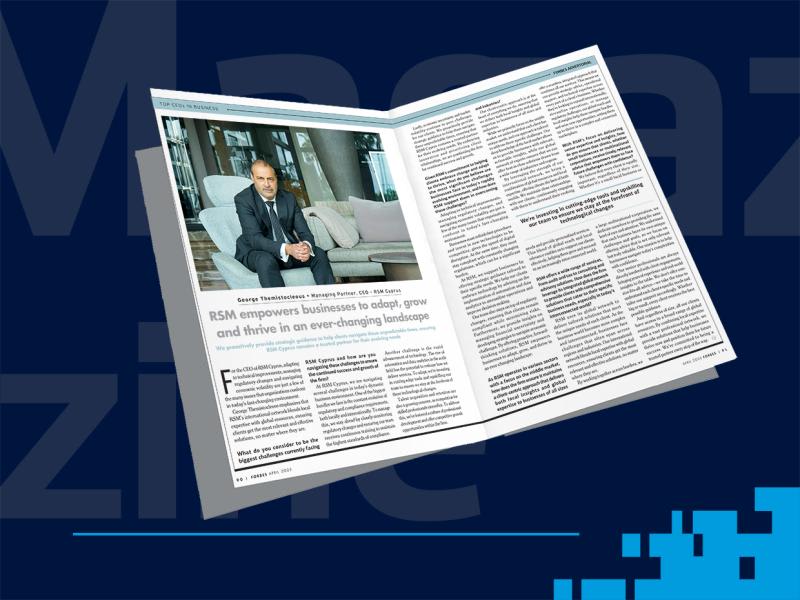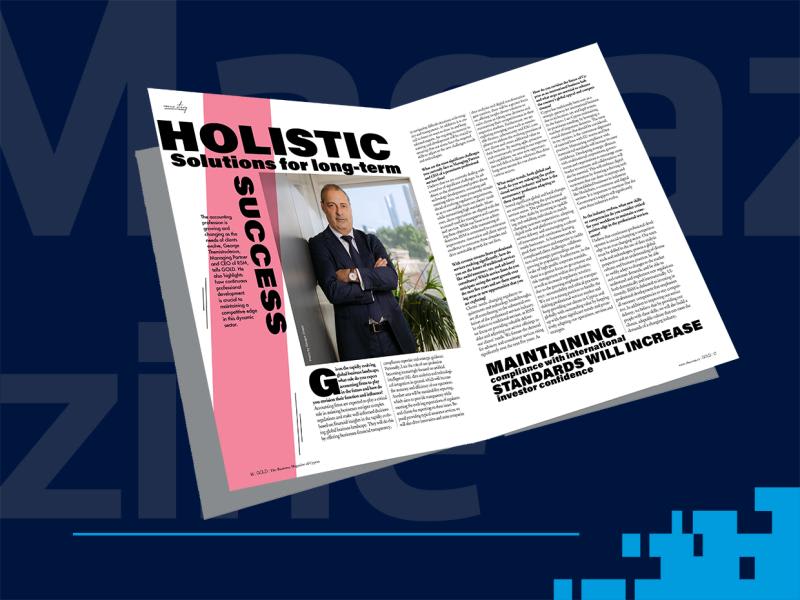George Themistocleous, Managing Partner and CEO of RSM Cyprus, explores the key drivers behind Limassol’s transformation in the professional services sector – from talent and technology to regulation and reputation – and expresses his views on what lies ahead for both the city and the industry.
G: From accounting and legal services to corporate advisory and fund administration, Limassol continues to attract high-calibre firms. What is it about the city that has enabled this cluster to flourish?
G.T.: Limassol has become a natural gathering point for top-tier firms in accounting, legal, corporate advisory and fund services. The city’s international outlook, along with its business infrastructure, greatly fuels its success. Over time, this international outlook has attracted professionals from across the globe, helping cultivate a skilled workforce that actively fosters collaboration. The proximity of businesses aids the forging of effective partnerships and Limassol’s modern amenities, lively international populace and cosmopolitan lifestyle have turned it into an ideal city to live and work in. This combination has helped build a strong, trusted ecosystem that continues to grow.
G: In the broader context of Cyprus’ ambition to strengthen its standing as a financial and business hub, how does the professional services sector contribute to that narrative? What more can be done to elevate the country’s’ position on the international stage?
G.T.: Cyprus has set its sights on becoming a key player in finance and commerce, and a big part of that vision hinges on offering top-notch professional services. The presence of trusted firms in this sector draws in international businesses, creating a trustworthy environment. With a solid grasp of both local and global markets, Cyprus gives investors a reassuring sense of security. To boost its reputation on the world stage, the country needs to invest more in innovation, digitalisation and specialised training. Plus, increasing transparency and upholding high standards across the board will definitely help. With the right strategies and resources in place, Cyprus can keep shining as an appealing and lucrative spot for international trade.
G: The global accounting and audit profession is undergoing a significant transformation, driven by digitalisation, evolving regulations and new client demands. Which of these forces are most sharply felt in Cyprus, and how can the local sector remain both relevant and resilient?
G.T.: In Cyprus, digitalisation is the driving force that’s really shaking up the accounting and audit profession. Clients are now looking for real-time insights, automation and cloud-based solutions, which is pushing firms to invest in new technology and enhance their teams’ skills. Evolving international regulation, particularly on transparency and ESG reporting, is also making a significant impact. Local firms are stepping up by adopting advanced audit tools, boosting their data analytics capabilities and tightening their compliance frameworks. There’s a big emphasis on developing talent to make sure that professionals are ready for this new environment. While the rapid pace of change can be tough, it’s also opening up exciting opportunities for firms in Cyprus to modernise and provide even more value to their clients.
Building Limassol’s Future: Prioritising Talent, Innovation, and Global Visibility

To strengthen Limassol’s position as a professional services hub, we need to focus on three key priorities: talent, innovation and international visibility.
G: In your view, what will be demanded of next-generation accounting professionals? Is the Cypriot talent pool equipped to meet that requirement?
G.T.: I truly believe that the next-generation accounting professionals will go beyond numbers. They will be tech-aware, adaptable and able to see the bigger picture when it comes to business decisions. Strong communication skills are a must, along with a comfort level around data and a willingness to keep learning as the field evolves. Here in Cyprus, we’re fortunate to have a vibrant group of young professionals who are driven, well-educated and increasingly aware of these new expectations. However, we still have work to do; more training in areas like digital tools and modern reporting standards are essential. With the right guidance and investment, I am confident that our local talent is more than capable of meeting the challenges ahead.
G: What should be the strategic priorities for strengthening Limassol’s position as a hub for professional services in Cyprus and the wider region?
G.T.: To strengthen Limassol’s position as a professional services hub, we need to focus on three key priorities: talent, innovation and international visibility. First, it’s crucial to attract and keep skilled professionals, whether local or from abroad. This means that we need to invest in education, training and enhancing the overall quality of life. Next, embracing innovation through digital transformation will empower businesses to offer smarter, quicker and more valuable services. Lastly, Limassol should keep working on its global reputation by showcasing success stories and strengthening connections with regional and international markets. With its dynamic business community and strong foundations, Limassol is well-placed to lead, but staying competitive will require coordinated efforts across the private and public sectors.
G: To what extent has Cyprus embraced international accounting and audit standards? Is there still a gap between regulatory compliance and practical implementation by local firms and clients?
G.T.: Cyprus has made impressive progress in adopting international accounting and audit standards, with a solid regulatory framework in place. Most firms are committed to compliance, understanding its importance for maintaining trust and credibility with clients. However, there remains a gap between regulatory requirements and their consistent practical application. This is often due to the complexity of evolving standards and the need for ongoing training and support. Closing this gap will require continuous education, clearer guidance and a focus on building practical skills. Overall, Cyprus is moving in the right direction and, through a sustained effort, we can ensure even higher levels of quality and consistency across the sector.
G: How would you like Limassol’s professional services landscape to evolve over the next five years?
G.T.: By 2030, I hope to see Limassol as an even stronger and more established regional hub for professional services while still maintaining its unique character as a vibrant Mediterranean seafront city. The blend of a modern, forward-thinking business environment with the relaxed, authentic island lifestyle will continue to make Limassol stand out. I also expect the city to further develop the combination of advanced technology and innovation, leveraging its island nature to foster close-knit collaboration and agility. This harmonious balance will not only position Limassol as a competitive centre for professional services but also as a truly inspiring place to live and work.





